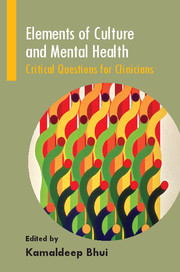Book contents
- Frontmatter
- Contents
- List of contributors
- Foreword: Desire and commitment: essential ingredients in learning about culture and mental illness
- 1 Is trauma-focused therapy helpful for survivors of war and conflict?
- 2 Will ethnopsychopharmacology lead to changes in clinical practice?
- 3 Does cognitive–behavioural therapy work for people with very different cultural orientations and backgrounds?
- 4 Can you do meaningful cognitive–behavioural therapy through an interpreter?
- 5 Are particular psychotherapeutic orientations indicated with specific ethnic minority groups?
- 6 Can psychotherapeutic interventions overcome epistemic difference?
- 7 On the role of culture and difference in evaluation, assessment and diagnosis
- 8 Necessary and sufficient competencies for intercultural work
- 9 On the validity and usefulness of existing Eurocentric diagnostic categories
- 10 Benefits and limitations of the cultural formulation in intercultural work
- 11 Barriers to the intercultural therapeutic relationship and how to overcome them
- 12 How does intercultural interpretation work in the mental health setting?
- 13 Do the power relations inherent in medical systems help or hinder in cross-cultural psychiatry?
- 14 Recovery and well-being: a paradigm for care
- 15 Social perspectives on diagnosis
- 16 Public mental health and inequalities
- 17 Can you do psychotherapy through an interpreter?
- 18 Can race and racism be acknowledged in the transference without it becoming a source of therapeutic impasse?
- 19 Cultural competence: models, measures and movements
- 20 Religion, spirituality and mental health
- Index
17 - Can you do psychotherapy through an interpreter?
Published online by Cambridge University Press: 01 January 2018
- Frontmatter
- Contents
- List of contributors
- Foreword: Desire and commitment: essential ingredients in learning about culture and mental illness
- 1 Is trauma-focused therapy helpful for survivors of war and conflict?
- 2 Will ethnopsychopharmacology lead to changes in clinical practice?
- 3 Does cognitive–behavioural therapy work for people with very different cultural orientations and backgrounds?
- 4 Can you do meaningful cognitive–behavioural therapy through an interpreter?
- 5 Are particular psychotherapeutic orientations indicated with specific ethnic minority groups?
- 6 Can psychotherapeutic interventions overcome epistemic difference?
- 7 On the role of culture and difference in evaluation, assessment and diagnosis
- 8 Necessary and sufficient competencies for intercultural work
- 9 On the validity and usefulness of existing Eurocentric diagnostic categories
- 10 Benefits and limitations of the cultural formulation in intercultural work
- 11 Barriers to the intercultural therapeutic relationship and how to overcome them
- 12 How does intercultural interpretation work in the mental health setting?
- 13 Do the power relations inherent in medical systems help or hinder in cross-cultural psychiatry?
- 14 Recovery and well-being: a paradigm for care
- 15 Social perspectives on diagnosis
- 16 Public mental health and inequalities
- 17 Can you do psychotherapy through an interpreter?
- 18 Can race and racism be acknowledged in the transference without it becoming a source of therapeutic impasse?
- 19 Cultural competence: models, measures and movements
- 20 Religion, spirituality and mental health
- Index
Summary
The challenges of providing therapies in a culturally and racially diverse society have been reviewed elsewhere (Bhui & Morgan, 2007). In this chapter, I consider the individual psychotherapy frame, which involves two people meeting to discuss the mind of one of them. The encounter involves trust, a human relationship and a sense of connecting with another person in that trusting relationship, so that the client is able to bring their worries, distress, maladies and tragedies into the conversation. The symbolism of the place of healing and the status and power of the healer become relevant as the context of an emotionally charged relationship through which recovery takes place. This notion of therapy presumes that bringing such information into the conversation is culturally sanctioned and seen as a way of improving distress and illness. The client risks rejection and loss of understanding about the personalised meaning of the tragedy; the task involves sharing mental experiences and memories, putting words to them, articulating thoughts about them, questioning these thoughts and the construction of the memories and experiences.
The very act of talking about and putting into words deep personal emotional experience formed from the present and the past results in an alienation of the words from the experience (Nobus, 2000). Communication of internal states of mind is difficult even in a shared language. Across languages and cultures, the task must include slow and paced review of all that is thought to be known and assumed by both therapist and patient. This can undermine any modality of therapy, leading to unexplained drop out from treatment and therefore a lack of effectiveness, what Morgan (1998) has called the ‘silence of race’.
Group therapy and family therapy pose specific challenges, as the mental material of many individuals is revealed for its historical interactions, with varying and perhaps contradictory accounts found in the reconstructions of the same events, and all to be discussed, reflected upon, challenged and then worked through emotionally. Such processes will seem as alien to some patients as might rituals to address Jinn or Zar possession are to some therapists.
- Type
- Chapter
- Information
- Elements of Culture and Mental HealthCritical Questions for Clinicians, pp. 76 - 78Publisher: Royal College of PsychiatristsPrint publication year: 2013

